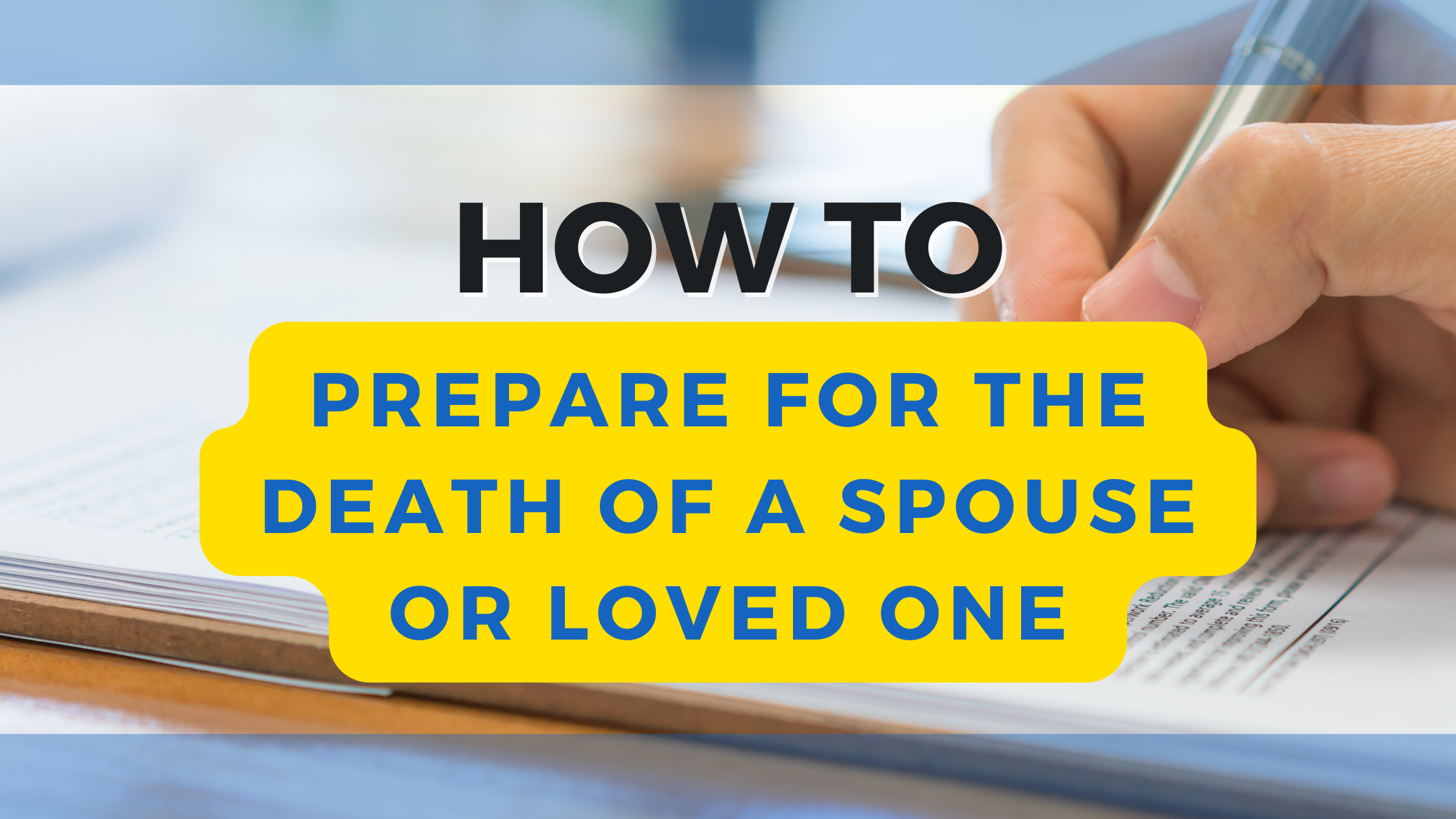It’s challenging on many levels to prepare for the death of a spouse or a loved one.
There are the emotional aspects, and there are also the financial, administrative, and family dynamics to consider.
There are good odds that if you’ve never been through the steps you need to take after a spouse or loved one dies, you may be in for a few rude surprises. This article will walk you through common mistakes people make and how you can prepare yourself to make it easier after a death.
A few honest, difficult conversations combined with thorough preparation can make a world of difference when preparing for the death of a spouse.
Review Your Estate Plan
The first step is to review your spouse’s estate plan. This means looking at your Will or Trust to see if you need to update their executor and successor executors. It’s also the time to review who is in their Will and whether those are the correct people to receive assets after they pass.
If you are going to be the surviving spouse, does everything come to you? If you are above the federal estate tax exemption amount or above your state’s estate tax exemption amount (if your state has estate taxes) does it provide for the ability to do a marital disclaimer trust to preserve the estate tax exemption amount?
If the intention is for certain assets to pass to others, does your Will provide for that?
It’s also the time to review account titling.
Are there any individual accounts that should be joint? I’ve seen married couples set up individual bank accounts thinking they will get around to adding their spouse, but forget. That can create unnecessary phone calls and paperwork after death for sometimes very small amounts of money.
I also often see people add payable on death or transfer on death designations to bank accounts and brokerage accounts because a friend or the internet told them it can avoid probate and probate should always be avoided.
While transfer on death designations can have their place, if you provide for specific gifts in your Will, such as $50,000 to XYZ charity and $10,000 to my friend Jolene, but there is no money in your estate, those gifts may not be fulfilled. If you need to pay estate taxes or cover final expenses, you may want money inside of the estate to cover them.
If you paid good money to set up a trust, but you never put your assets into the trust, now is the time to transfer them into the trust. It could be homes, bank accounts, brokerage accounts, or any other non-retirement accounts. Go back and look at what the attorney prepared. They likely included language in your estate plan that says you are responsible for moving most of your non-retirement accounts into the trust.
While you are reviewing your estate plan, go through your DPOA for Finances. If it’s “springing”, meaning it is only effective after certain conditions are met, such as two physicians saying you are not capable of managing your affairs, consider whether you want one that is effective immediately.
I often see families want to help a loved one with their finances, but many physicians do not feel comfortable declaring someone incapacitated unless it’s very clear they can’t take care of themselves, such as after a stroke in a hospital. In the real world, you often find yourself in a grey zone where someone forgets to pay their bills, may not take their medications as directed, gives too much money away, or falls victim to pig butchering scams, but they may still be able to hold a conversation and get through a 15 minute chat with a physician who says they have deficits, but are fine because they don’t meet the medical definition of incapacitated even though they are making decisions that harm their finances.
Next, review your Power of Attorney for Healthcare and Advanced Directives. Have a conversation with your spouse about what type of care you want under different circumstances. Write it down. In the moment, it can be hard to remember. Having a document with their wishes to reference about what quality of life is acceptable can help you decide what type of care they want as they are dying.
While you are at it, check the beneficiaries of every account. Double check them again. Is there an IRA, Roth IRA, 401(k), life insurance policy, annuity, or some other account with the wrong beneficiaries?
Lastly, think about any illiquid assets you have, such as a home, vacation property, or business. If you are leaving it to multiple beneficiaries, consider whether you are better off leaving it to one person. For example, it may go to your surviving spouse, but then multiple children. Do you want to change that now to avoid it going to multiple children?
Illiquid assets are often assets that cause issues because everybody has a different idea of what should happen with it. For homes, it might be one adult child wanting to move in while not buying out or paying rent to other children. One may want to sell while another wants to become a landlord and rent it. For businesses, one adult child might be heavily involved while others are not, but still reap the benefits without any of the effort.
When possible, it’s usually easier and cleaner to leave a home or other illiquid asset to one heir and even it out with other assets.
Before your spouse dies, it might be helpful to have those conversations about who may want the home or illiquid asset.
Organize Important Documents
The last thing someone wants to do after their spouse dies is try to find important paperwork that’s been buried somewhere in the house for 20 years.
Now is the time to locate the originals of the estate plan, insurance documents, marriage certificate, birth certificate, Social Security card, and financial account statements.
Look for motor vehicle titles, deeds to real estate, and double check that anybody who needs to be on the safe deposit box is listed. It’s extremely challenging to access a safe deposit box after the death of a spouse if you are not listed.
Review all your bills, such as cell phone, internet, utilities, and other recurring expenses. Are you on those bills and have authorization to speak with the companies?
It’s frustrating to call companies after the death of a spouse only to be told they can’t speak with you, and won’t give you any information.
Before your spouse or loved one dies, I recommend downloading current financial statements and CSV files of all transactions. Online account access is sometimes shut down after a financial institution is notified of a death, and those statements and transaction files can be helpful to reference to cross check whether any bills are missed, debts are outstanding, or to know what needs to be canceled.
While having your loved ones login information and password may allow you access for a short time, you may find yourself shut out of the account quickly. That’s why an electronic copy is important.
Lastly, make a list of any debts outstanding. If you need to go through probate, it’s helpful to know which creditors may reach out, and your attorney can also help you prioritize who should be paid and in what order before distributing assets to beneficiaries.
Passwords and Login Information
Although there are risks with sharing login information and companies usually say it’s a breach of their terms of service, you may want to consider sharing your login information with your spouse or loved ones.
For example, emails are often used for two-factor authentication and access to many websites. If your spouse passes away, having access to their email can mean the difference between being able to pay a bill, getting that two-factor code to login to certain websites, and accessing old information you may need.
If it’s a loved one and not a spouse who is about to pass away, you may want to see if you can have your own separate login to certain websites, such as paying bills, medical information, and make sure mail is forwarded to your address.
If you have any digital assets, such as crypto, photography albums, or anything else online, is there a way for the surviving spouse or loved one to access it?
For social media, talk with your loved ones about what you want to happen to your account.
For example, Facebook, Instagram, and LinkedIn allow you to submit a request to “memorialize” an account, which allows it to stay on the platform, but nobody can make changes to it.
Platforms like X allow authorized persons to request they remove your loved one’s profile.
You can go the old fashion route of pen and paper to share login information, but I’m a fan of password managers. Depending on the one you choose, you may be able to allow access after a certain period of time of you not responding, such as if you died. They are also helpful if you need to share passwords among family members.
Review Cash Needs
Something that catches many people by surprise is that once an account owner is dead, the account is frozen. That can even happen with a joint account.
That’s particularly frustrating because normal bills have to be paid plus extra expenses, such as funeral costs, paying for death certificates, and other costs associated with death.
If you are going to be the surviving spouse, it’s important to know how your bank or financial institution handles the accounts after death. You may even want to open a separate account in your name.
If the financial institution requires a death certificate, it can take more than a week to receive it. If you need immediate cash or your credit cards are close to their maximum, you may want to have extra cash on hand, pay them off early, or talk to family members about paying for items until you can pay them back.
Although you’d hope companies would be sympathetic to the death of a loved one, bills continue: mortgage, property taxes, insurance, cell phone, utilities, and more.
The immediate needs are important, but it’s also critical to determine what you need going forward. If your spouse was collecting a pension and didn’t select a survivorship option, you may see a decrease in income. You may also need to adjust your lifestyle when you go down to one Social Security benefit.
This is a good time to review your spending and see if you’ll need to change your monthly withdrawal from your investments.
Decide on Funeral Arrangements
My dad paid for his cremation, told us he didn’t want an obituary, and didn’t want any services or a celebration of life. It was one of the best final gifts he gave us.
When he died, we knew who to call, and they took care of everything. It was such a blessing to not have to worry about picking a funeral home, trying to imagine what he would have wanted, and paying for it.
If you feel likely that death is within the next year or two, I’m a big proponent of arranging for and paying for a funeral or cremation and detailing what sort of services you want honoring your life, if any.
If it’s beyond a year or two, I’m more hesitant simply because transporting a body more than 10 or 15 miles can get expensive, so if you may move to be closer to family or die while traveling, the prepayment may not be as helpful.
Although the financial aspect is helpful, knowing what your spouse or loved one wants is also a gift. Some people want a celebration of life while others want a somber occasion. Even if your person says they want to be cremated, what do they want done with their ashes? That can be an awfully hard decision to make.
Don’t forget about the guest list! Maybe there is someone your spouse wants to be make sure is included or even excluded. If you know the venue capacity and format, it makes it easy to know who to invite.
Finally, you may want to have your loved one attempt to write their own obituary if they want one. Although it can be a cathartic experience for some people to write one after death, it’s one more task that has to be done, often with brain fog.
Write Specific Gifts of Personal Property
Remember that one page sheet that your attorney included with your estate plan? Now is an excellent time to have your spouse write down where they want specific property to go if it’s not to you.
If you have kids and want to share meaningful time together, consider inviting them over and having them go in turns putting stickers on items they want when your spouse passes. It sounds morbid, but I’ve heard of many families who have done it. It has created lasting memories and encouraged meaningful discussions about sentimental pieces.
If there are certain items you don’t need, consider making a plan for them. For example, if you are a two car family and you no longer need two cars, consider selling the extra car before death. The last thing many people want to do is to contact their local DMV to have the title changed into the surviving spouse’s name.
Meet with Professionals
If you have an attorney, accountant, financial planner, or other professionals, meet with them as a couple. I often see one spouse more involved with professionals than the others, and if that is the one who is passing away, it can make for an awkward transition.
They should have the opportunity to build rapport and be comfortable with them because there is usually a lot of work that needs to be done together after a death.
For the attorney, it might be probate, updating the estate plan, and guiding them through how to pay creditors. With an accountant, there may be a final tax return and an estate tax return. With a financial planner, there may be opening new accounts and transferring funds while making a new financial plan for the future.
I often hear of people meeting with their loved ones professionals after they pass, but unfortunately, if something could have been simplified or changed to make the process easier, it’s too late.
I encourage folks to meet with them before death, double check everything is set up as intended, get to know them, and then meet with them after death to decide on next steps.
And if you don’t have these professionals, consider whether it’s worth it to have an expert in your corner to guide you in a process you may have never done before.
Create Audio or Video Messages
The last step you may want to take is to record audio or video messages of your spouse. You may want to encourage them to record a video message on your birthday or kids birthdays. Maybe they want to record a few messages for when you are having a tough day.
Not everybody is emotionally prepared to listen or watch recordings of a loved one who has passed, but for many, it’s a gift.
It’s a way for them to be remembered. Many people talk about how they slowly start to not remember how their loved one sounded, and a short message can bring that back.
If your spouse isn’t up for creating an audio or video message, you may want to look through your online photo albums for the photos and videos you have together. Often, it’s one spouse who does most of the recording, which means you may not have access or know what exists.
Final Thoughts – My Question for You
Preparing for the death of a spouse or loved one is not easy.
It’s emotional. It’s administrative. It feels like you should simply be able to enjoy time with your person.
It’s also one of the last times you may have to get a plan in place or correct an oversight from a plan you previously created.
I’ll leave you with one question to act on.
What steps will you take to prepare for the death of a loved one?




